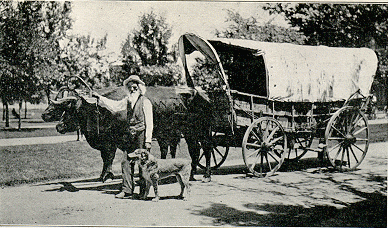Ezra Meeker, the Quintessential Pioneer

Ezra Meeker was one of the young emigrants who came to the Pacific Northwest in search of a prosperous farm life for his family. He found that, but he also, late in his life, found another cause: recognition for the travails and accomplishments of the emigrants. Ezra Meeker became the embodiment of their life stories. His whiskery visage, the postcard views of his covered wagon and his two oxen, Dandy and Dave, his string of memorials along the route of the Oregon Trail, all still say "frontier" to us.
Meeker was born in Ohio in 1830, lived in Indiana as a child, and in 1851 married a young woman who shared his interest in farming. The went west, to Iowa, but the cold winter inspired them to look even farther west, and so they started for Oregon in the spring of 1852, taking their newborn son with them. By 1853, the Meekers had reached the Puget Sound country, and settled permanently in Puyallup in 1862. Here Meeker developed an extensive and profitable hop-raising business. Parasites destroyed the industry in the region in the late 1880s. Starting in 1898, the undaunted Meeker made four trips to the Klondike in search of gold, but success eluded him.
He found another kind of success when he began his efforts to mark the route of the Oregon Trail that he and Eliza Jane had taken west in 1852. Now in his 70's but still hale and hearty, Meeker crossed the continent with his replica covered wagon, raising funds to erect memorials along the route and eventually meeting with President Theodore Roosevelt in Washington, D. C. Meeker became a splendid publicist, issuing booklets and postcards, inspiring newspaper and magazine articles about his efforts. Before his death in 1928, just a few days shy of his 98th birthday, Ezra Meeker had not only walked the Oregon Trail several times, he'd ridden along it in an automobile and aboard a train, and flown over it in an airplane: he'd come a long way, and for many his story symbolized the opportunities that had been available on the frontier.